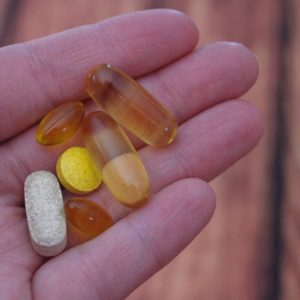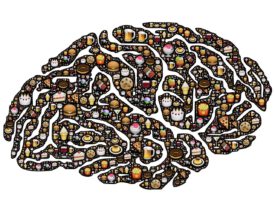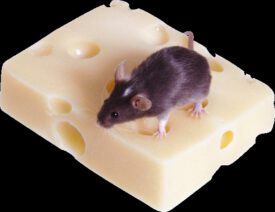Can mineral-vitamin treatment change the microbiome? Yes, it can!
This week, my lab at the University of Canterbury published the first investigation [1] into whether a mineral-vitamin supplement could change the bacteria in the microbiome of children with ADHD. Our preliminary data, based on our sample of 17 kids (half of whom were given micronutrients and half were given a placebo for 10 weeks), hints at increased diversity and changes in the types of bacteria contained in the microbiome of the children exposed to the micronutrients. This type of study starts to move us beyond the efforts to show that micronutrients benefit some people with psychiatric symptoms, and towards figuring out why they might exert their influence. So, what does this mean?...
Measuring impulsivity in 3-year-old children
For my research, I measured impulsive behaviour in 3-year-old children. Briefly, impulsivity is the opposite of inhibitory control. There are several forms of inhibitory control, and although there is no official categorization of different forms of inhibitory control in young children, Anderson & Reidy [1] defined five categories. The categories are:...
What the genetics of cocaine dependence can teach us about other psychiatric conditions
Behavior results from the complex interplay between genes and environment. Our genes predispose us to how we act and feel, by influencing how our brain develops and functions. This way, certain genetic variants in our genome increase the risk of developing mental health problems (while others may decrease this risk). Whether someone actually develops a mental health disorder or not, depends on many other factors in our environment, such as stressors and experiences. Nonetheless, studying these genetic risk factors for mental health conditions is an important aspect of understanding these disorders. As an example of such research, we have now...
Stress-induced food addiction – how everyday life stressors alter our dietary habits
Probably the best-known example of how the brain and mental health are linked to nutrition and our gut, and the one that we can all identify ourselves with, is stress. We all know it: studying 24/7 for an important exam, pressure in the job or even a house full of work. We have no time to think and – no – we definitely don’t have time to cook. But at the same time, we are constantly hungry, craving for a snack. The fastest solution? The next best, nicest looking, edible piece of food we can find. But why do we change...
How to navigate in a world that is constantly reporting scientific findings?
In the Eat2beNICE project, the researchers aim at studying the effect of diet and mental health and our blogs are meant to enlighten readers. Everyday research findings published in journals will offer an opinion on how to best live our lives. It is simply not possible, nor advised, to change your habit after every piece of new knowledge. On the other hand, researchers do need to publish their results in order to have their findings discussed and reproduced. How do you as a reader navigate? No single study should alone be enough to change nutritional advice or guidelines. The research...
The effects of food insecurity on mental health
The effects of food insecurity on mental healthAccording to the food and agriculture organization, about 1 billion people in the world were living in hunger or insecurity in year 2010 (1). Additionally, 5 to 15 % of people in industrial countries experience food insecurity which makes it all the more a public health concern in Europe (2). But, what exactly is food insecurity about?Food insecurity means that the access to sufficient food, meeting the dietary and cultural needs and the individual food preferences for a healthy and active life is not possible. It is not only a lack of food,...
“When I stop my medication, everything goes wrong” – why some patients take their prescribed drugs and others don’t
When going to a doctor, you mostly aim for two things to happen: one, you want the doctor to tell you what kind of disorder you are currently suffering from and two, you hope for him or her to give you adequate treatment. While most people are able to follow their physician’s instructions well enough when they have to take medication like antibiotics for a few days, the longer the therapy needs to be, the less likely they are to “adhere”. Adherence is a term to describe to what extent a person’s behavior in taking medication corresponds with agreed recommendations...
How do our personalities influence what we eat?
Why do we eat what we eat? What makes us choose an apple over chocolate cake, or the other way around? How do we decide whether or not to have that tempting dessert, despite feeling satiated after a hearty meal? I previously wrote about how our daily food choices are, at least in part, influenced by our genetic make-up, but there are many other factors determining what, when, where and why we eat. Today I will discuss the importance of personality traits. Personality is a set of relatively stable traits, that together determine who we are. While some characteristics of...
How the LifeGene data can help us to explore the links between lifestyle and mental health
In our Eat2BeNice project we want to know how lifestyle-factors, and nutrition contribute to impulsive, compulsive, and externalizing behaviours. The best way to investigate this is to follow lifestyle and health changes in individuals for a longer period of time. This is called a prospective cohort study, as it allows us to investigate whether lifestyle and nutrition events at one point in time are associated with health effects at a later point. Luckily we can make use of the LifeGene project for this. LifeGene is a unique project that aims to advance the knowledge about how genes, environments and lifestyle-factors...
Why do we use mouse models in diet research?
Rates of obesity and metabolic diseases are rapidly growing, and much attention is paid to study the effects of consumed foods on human health. We know already that dietary preferences can be a serious factor of diseases and even a cause of them, in a man. However, we do not know molecular and cellular mechanisms behind these effects. Thus, we do not know how these negative processes can be neutralized or diminished by preventive or curative interventions. As such mechanistic studies are needed. These studies can be in principle carried out in vitro or in vivo. Food consumption and consumed...









